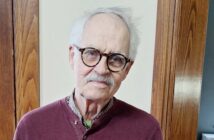At 729 Ridge St. in Southside rests a tawny beige three-story brick house. From the outside, it’s no different than the houses next door. On the inside, it’s a loving and supportive five-man home.
Squeakers, the house tabby cat, can be heard gently snoring from a couch.
“I wanted the house to have a certain family environment,” Sister Virginia Longcope, the founder of Stephen’s Place, said.
Stephen’s Place is a halfway house for men who have been incarcerated and have had a substance use disorder. The organization provides services to help men transition back into the community. Five male residents live in the house at a time, and the Stephen’s Place staff provides them with services including relapse prevention, counseling, job readiness support and a 12-step recovery program.
The house is named after Stephen Piston, who Longcope met in 1985 when she was working as a social worker at the South Carolina Department of Corrections. Piston was 19 years old and estranged from his family.
As their sentences were nearing completion, inmates could find living accommodations outside of prison, but only if they were employed and had a sponsor.
Piston was employed, but sponsorless. Longcope helped Piston find an apartment, which happened to be close to where she was living. She helped him adjust to post-prison life.
One day, Piston told Longcope she should start a place to help more people like him. This is what planted the seed for Longcope.
Longcope sought permission from her religious community’s council to approve her endeavor. The council told her that if she were to embark on this undertaking, she would have to fund it.
Longcope made an appointment with a realtor with $1,000 in her pocket. The real estate agent asked where she’d get the rest of the money to buy the house.
“You find a house, and I’ll find the money,” Longcope remembers telling the agent.

Josh Hill receiving his completion certificate. (Courtesy of Sherman Myers)
The Provincial religious community lent her $80,000 to buy the house. Afterward, she raised $40,000 in grants to put toward the loan.
In 1994, she moved into the house while renovations were being made. In that same year, two residents moved in.
“It is amazing,” Longcope said. “I always believed that God wanted it to happen or else it never would have happened.”
After running Stephen’s Place alone for 29 years, then 78-year-old Longcope felt she needed more help.
In October 2018, Longcope welcomed Sherman Myers to the Stephen’s Place family as the program coordinator. Myers is a recovering substance user and has been sober for 21 years.
Longcope said Myers has been a source of hope for the Stephen’s Place men on their journey to get clean.
“Right now, I’m at peace with who I am, and I’m passionate about what I do,” Myers said. “You know, Stephen’s Place gave me this opportunity.”
As the program coordinator, Myers helps residents develop life skills like budgeting and finding a job. He ensures residents are attending Alcoholics or Narcotics Anonymous, using outpatient treatment and completing their house chores.
On Sunday nights, the men take turns cooking meals for each other.
Thanksgiving is one of Myers’ favorite dinners at Stephen’s Place. The current residents and graduates come together to enjoy a meal prepared almost entirely by Myers. He said he loves to serve his famous pineapple soufflé.
Myers said the shared meals are important because some residents have never experienced family dinners before.
Jesse Shiner, a graduate of Stephen’s Place, said he felt supported by the family atmosphere at the house. For many years, Shiner went through phases of stopping substance use, ending up in rehab and ultimately relapsing.
“This place not only saved my life once, but twice,” Shiner said.
After serving time in jail, Shiner contacted Longcope and moved into Stephen’s Place in January 2013.
During his first stay, Shiner lived at Stephen’s Place for nine months and developed a strong support system. After leaving Stephen’s Place, he relapsed. He decided he wanted to be sober for good in April 2021.
“For the first time ever in my life, it wasn’t forced upon me,” Shiner said. “I made my own decision to go to rehab.”
When Shiner called Longcope asking to return, she agreed, so long as he promised to consistently attend house meetings. He stayed at Stephen’s Place for nine months again. This time was different.
Within months, Shiner reconnected with his father, mother and two sisters, with whom he hadn’t spoken in years. Shiner now has legal custody of his daughter.
“This time, I really was serious about doing something different and learning about myself,” Shiner said. “It gave me a foundation to build upon. But I had to want it. That was the difference between the first and the second time.”
Before getting to that point of progress, the men who come to Stephen’s Place must acclimate to their new environment.
When residents move in, they typically don’t bring much with them. Myers uses grant funding to take residents shopping for clothes and purchase cellphones.
“It doesn’t cost you to come here,” Myers said. “I mean, the cost is, you know, you had to go to jail or you got caught up in a substance abuse disorder.”
For residents to move into Stephen’s Place, they need to fill out an online application. If the resident meets the criteria, Myers visits them for a one-on-one interview at either a prison or treatment facility.
Whenever Myers interviews potential residents, he tells them about the massive hill that Stephen’s Place sits atop. He calls it the “hill of willingness.”
“I always tell the people I interview that if you’re willing to walk up the “hill of willingness” on a daily basis, then you really have a desire to stay clean,” Myers said.
Joseph Parenti is one of those willing men.
In 2013, Parenti was charged with driving under the influence, and in 2017, with retail theft. When released from probation, he decided he was ready for change.
Parenti became a resident of Stephen’s Place on March 23, 2022, and his probation concluded a year later. He is over 18 months sober.
Parenti walks down the “hill of willingness” every day at 5 a.m. to catch two buses to work as a cook at KFC.
“I’m trying to become a better man, and this place has really taught me to be the man I was supposed to be — you know, to be respectful, to be grown up and to be a law-abiding citizen,” he said.
While Stephen’s Place is a 90-day program, the men can stay until they are ready to live independently. Stephen’s Place graduates have a 73% chance of not becoming incarcerated again.
Longcope said that the graduates of Stephen’s Place often come to their annual Christmas party and Easter egg hunt. She said that many are now married and have children.
“Many of their lives have turned around,” Longcope said. “They have achieved goals they never thought possible.”

From left to right Jesse Shiner, Jacob Utess, Doug Spruill, Lee Coleman, Joseph Parenti, Renaldo Magobet, Terell Crouch on oheir annual Ocean City New Jersey weekend trip. (Courtesy of Sherman Myers).






Comment policy
Comments posted to The Brown and White website are reviewed by a moderator before being approved. Incendiary speech or harassing language, including comments targeted at individuals, may be deemed unacceptable and not published. Spam and other soliciting will also be declined.
The Brown and White also reserves the right to not publish entirely anonymous comments.